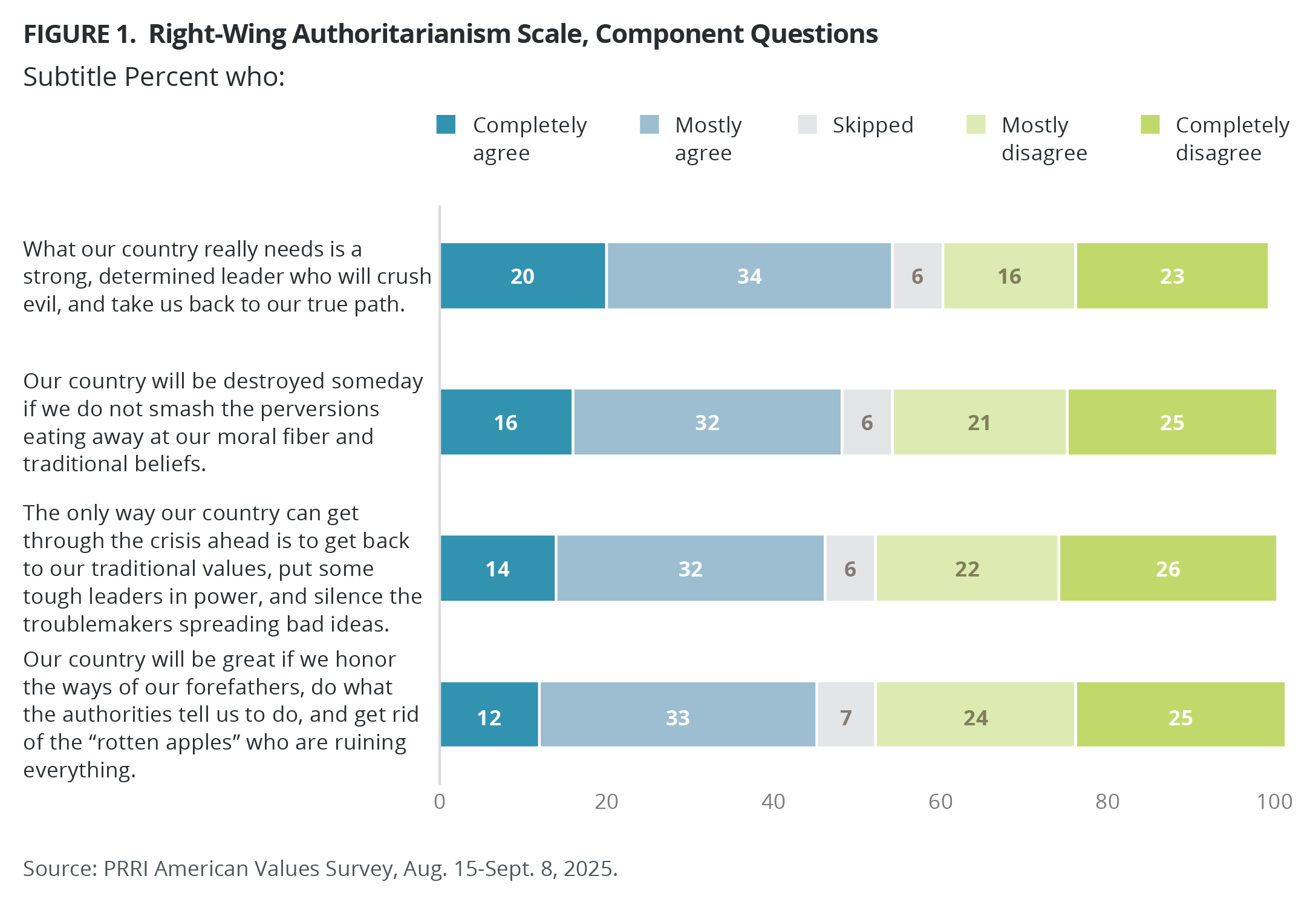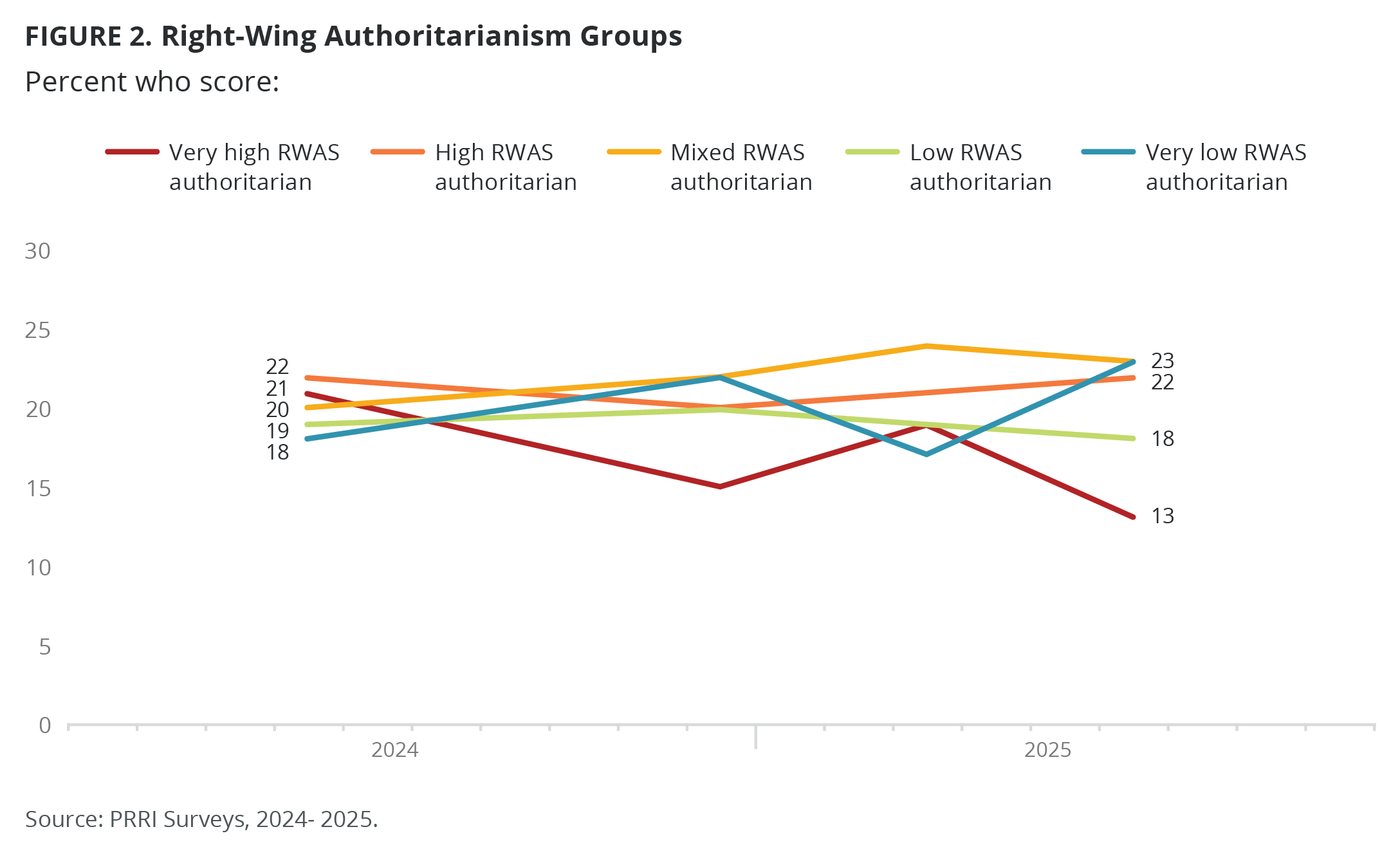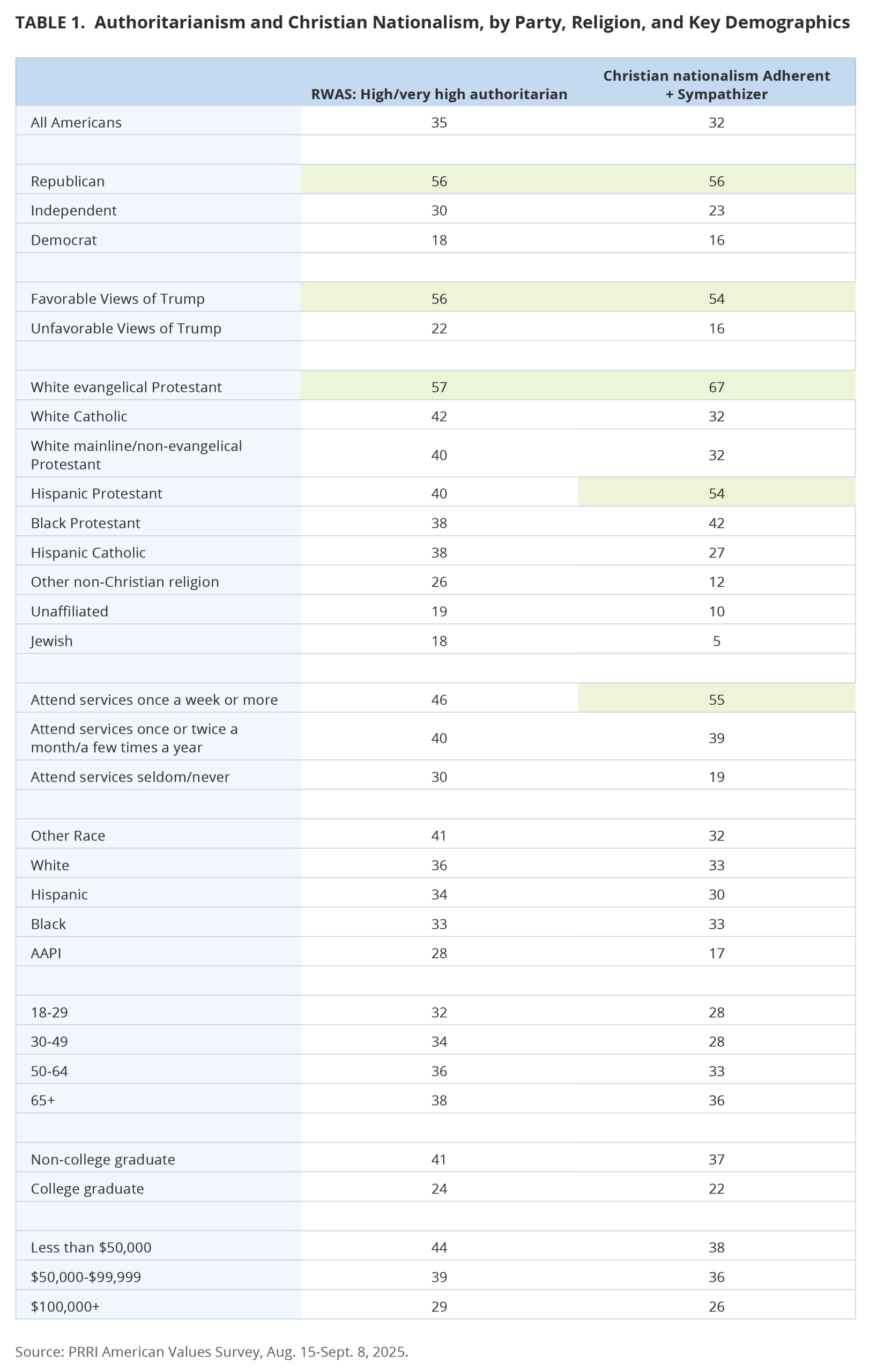PRRI Staff
Growing concerns about the appeal of an authoritarian leader in the United States have led PRRI to revisit long-standing measures of authoritarianism. Using data from the 2025 PRRI American Values Survey (AVS), this Spotlight examines which Americans are more likely to hold authoritarian attitudes, how these attitudes relate to support for Christian nationalism, and the key predictors of both.
The Right-Wing Authoritarianism Scale (RWAS) was developed to understand views related to deference to strong leaders, support for punishing opposition, and strict adherence to traditional values.[1] To measure right-wing authoritarianism among Americans, PRRI’s American Values Survey included the following agree/disagree questions used in previous studies:[2]
The statement with the strongest appeal is that the country needs a “strong, determined leader who will crush evil and take us back to our true path” (54% agree vs. 39% disagree). Overall, Americans are split on the rest of these statements.
Based on these four questions in our most recent survey, most Americans do not hold highly authoritarian views. Over one-third of Americans (35%) score very high or high on the Right-Wing Authoritarianism Scale (13% and 22%, respectively), compared with 41% who score low or very low (18% and 23%, respectively). Nearly one in four Americans qualify as having mixed opinions (23%). The proportion of Americans who score very high on the RWAS has dropped significantly since PRRI first asked these questions (from 21% in June 2024 to 13%), while the proportion who score very low has increased (from 18% to 23%). While there has been some fluctuation since 2024, when PRRI first began collecting data on authoritarian views, at all points in time, only a minority of Americans exhibit high scores on our scale.
Turning to the 2025 AVS, we find that Americans who score high on the RWAS vary considerably by party affiliation. Two-thirds of Republicans score high (56%), including 33% who score very high, compared with three in ten independents (30%) and 18% of Democrats. Americans who hold favorable views of President Donald Trump are 34 percentage points more likely than those who view Trump unfavorably to score very high or high on the RWAS (56% vs. 22%).
The only religious group where a majority scores high or very high on the RWAS is white evangelical Protestants (57%). Around four in ten white Catholics (42%), white mainline/non-evangelical Protestants (40%), Hispanic Protestants (40%), Hispanic Catholics (38%), and Black Protestants (38%) score very high or high on the RWAS. Fewer non-Christian Americans — including only 26% of other non-Christians, 19% of religiously unaffiliated Americans, and 18% of Jewish Americans— score very high or high on the RWAS.[3]
Nearly half of Americans who attend religious services at least once a week score high on the RWAS (46%), compared with 40% of those who attend services a few times a year and 30% of those who seldom or never attend services.
While there are no significant differences by race, gender, or age, scoring high on the RWAS decreases by education level and income. A slim majority of Americans who do not hold a four-year college degree (41%), compared with 24% who have at least a college degree, score very high or high on the RWAS. Americans with a household income under $50,000 are the most likely to score very high or high on the RWAS (44%), compared with 39% of those with a household income between $50,000 and $99,999 and 29% of those with a household income over $100,000.
Americans who score high on the RWAS also tend to score high on PRRI’s Christian nationalism scale, which consists of a battery of five questions first developed for the PRRI/Brookings Christian nationalism survey in 2023.[3] In PRRI’s latest survey, around one-third of Americans qualify as either Christian nationalism Adherents (11%) or Sympathizers (21%), compared with over six in ten who qualify as Skeptics (36%) or Rejecters (27%). White evangelical Protestants (67%), Republicans (56%), those who attend religious services at least once a week (55%), those who hold favorable views of Trump (54%), and Hispanic Protestants (54%) are the most likely to qualify as Christian nationalism Adherents or Sympathizers. White evangelical Protestants, Republicans, and those who hold favorable views of Trump also score high on the RWAS.
The Christian nationalism scale is positively correlated with the Right Wing Authoritarianism Scale; a strong majority of Christian nationalism Adherents and Sympathizers score high on the RWAS (65%), three times the rate of Christian nationalism Skeptics and Rejecters (22%). Among those who score high on the RWAS, the majority qualify as Christian nationalism Adherents and Sympathizers (58%). By contrast, among those who score low on the RWAS, just 17% qualify as Christian nationalism Adherents and Sympathizers.
PRRI finds that most Americans (78%) disagree that “because things have gotten so far off track, true American patriots may have to resort to violence in order to save our country,” including 49% who completely disagree, compared with 17% of those who agree. Republicans (22%) are more likely than independents (16%) and Democrats (12%) to agree that political violence may be necessary to save our country.
Notably, the majority of Americans who agree that political violence may be necessary to save the country score very high (30%) or high (31%) on the RWAS, compared with three in ten of those who disagree and score high (10%) or very high (20%) on the RWAS. Far fewer Americans who agree that political violence may be necessary have mixed opinions on the RWAS (18%) or score low (14%) or very low (7%).
PRRI developed a model to test various factors in predicting right-wing authoritarianism and Christian nationalism in 2025, finding that support for both is driven by favorable views of Trump, support for political violence, and cultural anxieties. Using data from the 2025 PRRI American Values Survey, we conducted a logistic regression model focusing on right-wing authoritarianism and Christian nationalism.
The models incorporate various demographic characteristics, including education, income, gender, age, race, marital status, parental status, party, Trump favorability, and support for political violence. Our logistic regression model also includes religious affiliation, frequency of worship attendance (weekly or more), and cultural anxiety through indicators such as agreement with the “Great Replacement Theory” (the belief that immigrants are invading the country and replacing its cultural and ethnic identity), and attitudes about gender. Finally, the models also account for economic anxiety, including perceptions of a worsening personal economic situation and concerns about meeting family needs.
Americans with favorable views of Trump and who support political violence are at least twice as likely as those with unfavorable views and no support for violence to hold authoritarian and Christian nationalist views. Notably, support for political violence is more strongly linked to RWAS (2.8x) than to Christian nationalism (2.3x). Similarly, Republicans are nearly twice as likely as Democrats to hold authoritarian and Christian nationalist views. Further, those without a college degree and with lower incomes are more likely than college-educated and higher-income Americans to score high on the RWAS and to hold Christian nationalist views. Gender matters in the RWAS model, but not by much.
Compared with unaffiliated Americans, white evangelical Protestants and Black Protestants are about three times as likely to score high on the RWAS, while Hispanic Protestants and other Christians are about twice as likely.[5] When it comes to support for Christian nationalism, the gaps are much larger: white evangelicals (6.5x), Hispanic Protestants (6.0x), Black Protestants (5.1x), and other Christians (3.4x) all show much higher odds than unaffiliated Americans. White mainline Protestants, white Catholics, and Hispanic Catholics show more modest differences (about 2x) on both RWAS and Christian nationalism. Non-Christians do not differ significantly from unaffiliated Americans.
While attending religious services weekly (2.8x) or monthly (1.9x) is highly predictive of Christian nationalist views compared with seldom or no attendance, frequency of religious attendance is not significantly related to right-wing authoritarianism.
Except for a weak link with Christian nationalism, economic concerns show no meaningful association with either authoritarian or Christian nationalist views, but cultural concerns do. Americans who agree with the “Great Replacement Theory” — the belief that immigrants are invading the country and replacing its cultural and ethnic identity — and who agree that society as a whole has become too soft and feminine are about twice as likely as those who disagree to score high on the RWAS and to hold Christian nationalist views.
[1] For more information on the first time PRRI collected data using the Right-Wing Authoritarianism Scale, see our September 2024 report “One Leader Under God: The Connection Between Authoritarianism and Christian Nationalism in America.”
[2] Respondents’ answers across all four questions are highly correlated, with a Cronbach’s alpha of 0.90, indicating a high degree of reliability for the scale.
[3] “Other non-Christians” includes Muslims, Buddhists, Hindus, Unitarian Universalists, and members of other religions.
[4] PRRI has three major reports using our Christian nationalism scale: a national study released in February 2023 and two studies with results for all 50 states released in February 2024 and 2025. Respondents were asked whether they completely agree, mostly agree, mostly disagree, or completely disagree with each of the following statements: (1) The U.S. government should declare America a Christian nation. (2) U.S. laws should be based on Christian values. (3) If the U.S. moves away from our Christian foundations, we will not have a country anymore. (4) Being Christian is an important part of being truly American. (5) God has called Christians to exercise dominion over all areas of American society. For more information on the Christian nationalism scale, see PRRI’s most recent report: https://prri.org/research/christian-nationalism-across-all-50-states-insights-from-prris-2024-american-values-atlas/
[5] Due to small sample sizes, we collapsed the following into “Other Christians” category: Protestants of color, other Catholics of color, Jehovah’s Witnesses, Latter-day Saints, and Orthodox Christians. Non-Christians include Jewish Americans, Muslims, Buddhists, Hindus, Unitarians, and other non-Christian groups.
1400 16th Street NW
Suite 525
Washington, DC 20036
info@prri.org
202.238.9424
press@prri.org
202.238.9424
